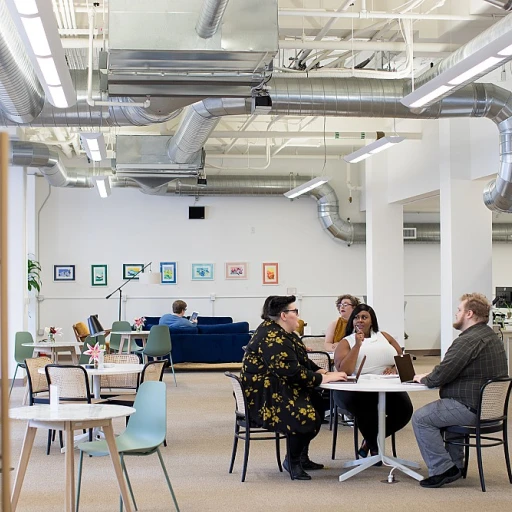
Understanding Employee Engagement in Construction
Defining Engagement Within the Construction Environment
Employee engagement in the construction industry is a nuanced concept that hinges on how involved and committed workers are to their jobs within the company. Understanding its core tenets can improve both employee satisfaction and customer experience, ultimately aiding the business's bottom line. In construction, the physical and demanding nature of the work requires a different approach to engagement than in other industries. Companies often use feedback, including satisfaction surveys and customer feedback, to gauge morale and engagement levels. Listening to employees through real-time surveys and addressing their concerns helps foster a trustworthy environment, which in turn reflects positively on customer satisfaction. A construction company's workflow often involves multiple teams working simultaneously on different aspects of a project. The experience of your employees directly influences the service provided to clients. Therefore, understanding the feedback from the field can provide actionable insights that help fine-tune the employee engagement strategies. Leveraging data collected from these surveys can lead to an improved customer journey and service provision. Survey questions often include a mix of multiple choice and open-ended formats to provide comprehensive data sets. Variants like the Likert scale are popular for measuring aspects of engagement like satisfaction, morale, and loyalty of the team. Higher engagement levels often translate to better product service delivery as employees are more committed to maintaining the company's standards and values. To gain deeper insights into engagement levels, businesses in the construction sector should regularly review feedback management systems. Regularly scheduled surveys, both internal and those addressing customer experience, help paint a complete picture of the company landscape. By focusing on these metrics, teams can enhance their approach, adapting methods that previous success stories in construction have showcased. For further inspiration, exploring inspirational quotes to boost workplace engagement can provide leaders and managers with the morale-boosting tools needed to maintain a high level of engagement within their teams.The Impact of Employee Engagement on Customer Satisfaction
How Engaged Employees Shape Customer Perception
In the construction industry, the correlation between employee engagement and customer satisfaction cannot be underestimated. Employee engagement directly influences the quality of customer service and client experiences. Engaged employees tend to have a greater commitment to their roles, leading to remarkable customer interactions that can significantly enhance overall client satisfaction. A well-engaged team is more likely to proactively address customer needs and respond effectively to customer feedback. This responsiveness fosters a positive customer journey, ensuring that clients feel valued and heard. A company that prioritizes employee engagement can often see improvements in customer loyalty and net promoter scores. Customers become more willing to recommend services to others when they consistently receive excellent customer support and product service.The Ripple Effect on Customer Satisfaction
The impact of engaged employees is reflected through every stage of the customer experience. By leveraging satisfaction surveys and customer feedback, businesses can gain actionable insights into their product performance and service quality from customer perspectives. Engaged employees are more motivated to respond to open-ended questions in surveys, giving well-rounded insights that are critical for business success. Moreover, customers can feel when employees are genuinely invested in the company’s success. This instills confidence and trust, encouraging repeat business. Engaged teams help ensure that each customer interaction is tailored to meet specific needs, translating into higher satisfaction rates. According to strategically crafted development goals, companies that focus on growing employee skills and fostering an environment of support are better positioned to capture issues in real-time. This proactive stance not only resolves customer concerns quickly but also showcases a commitment to excellence, reinforcing the company’s image as a reliable partner in the construction industry. Ultimately, a vibrant employee engagement strategy not only supports the workforce but directly benefits customers by enhancing every facet of their experience.Strategies for Boosting Employee Engagement
Building a Culture of Engagement
In the construction industry, fostering a culture that prioritizes employee engagement is essential for enhancing customer satisfaction. A committed team is more likely to deliver exceptional customer service and contribute positively to the overall customer experience. Here are some strategies to boost engagement:
Encouraging Open Communication
Open communication channels between management and employees can significantly impact engagement levels. Regular feedback sessions and surveys can provide valuable insights into employee satisfaction and areas for improvement. Consider using a mix of open-ended questions and multiple choice formats in your surveys to gather comprehensive data.
Recognizing and Rewarding Efforts
Recognition is a powerful motivator. Implementing a system that acknowledges and rewards employee contributions can enhance motivation and commitment. This could be through formal recognition programs or informal acknowledgments during team meetings. Such initiatives not only boost morale but also encourage a culture of appreciation.
Providing Opportunities for Growth
Employees are more engaged when they see a clear path for career advancement. Offering training programs and career development opportunities can help employees feel valued and invested in the company’s future. This approach not only benefits the employees but also enhances the skill set available to the company, ultimately improving customer satisfaction.
Implementing Feedback Management Systems
Utilizing feedback management systems can help track employee engagement levels in real time. These systems allow for the collection of actionable insights through surveys and feedback sessions, enabling the company to make informed decisions that enhance the employee experience. Regularly reviewing this data ensures that the company remains responsive to employee needs.
Fostering Team Collaboration
Encouraging collaboration among team members can lead to a more cohesive work environment. Team-building activities and collaborative projects can strengthen relationships and improve communication. A well-integrated team is more likely to deliver a seamless customer journey, enhancing overall satisfaction.
By implementing these strategies, construction companies can create a more engaged workforce, leading to improved customer satisfaction and a stronger business performance.
Measuring Employee Engagement Effectively
Accurate Methods to Gauge and Interpret Engagement
Measuring employee engagement effectively requires a multifaceted approach that goes beyond surface-level indicators. The construction sector, with its unique challenges and environments, demands tailored methods to ensure accurate assessments. Identifying how engaged employees are can provide valuable insights into the correlation between engagement levels and customer satisfaction. To achieve this, several techniques and tools should be considered:- Surveys and Questionnaires: These are invaluable tools in gathering direct feedback from employees. Utilizing customer satisfaction methodologies such as Likert scale questions can help capture nuanced perspectives on engagement levels. It's crucial to ensure that survey questions are clear, actionable, and cover aspects directly impacting the employee experience.
- Customer Feedback Integration: Linking employee engagement metrics with customer surveys can reveal how employee satisfaction directly impacts the customer journey. Insights from customer support interactions and net promoter scores (NPS) can offer a dual perspective on service quality and employee involvement.
- Appraisal Data and Real-time Feedback: Using technology to collect real-time feedback provides ongoing insight into how employees perceive their role and the company. Regular feedback management, coupled with performance appraisal data, can highlight areas needing attention and ensure alignment with company objectives.
- Data Analysis Techniques: Employing data-driven methods helps in identifying trends and patterns. Analyzing satisfaction surveys, open-ended responses, and product feedback allows businesses to tailor strategies effectively, enhancing both employee engagement and customer experience.
Case Studies: Success Stories in Construction
Success Stories in the Construction Industry
When it comes to improving employee engagement in the construction sector, there are several remarkable examples that showcase the significant impact of effective strategies. These success stories not only highlight the benefits of enhanced employee satisfaction but also establish a direct connection to improved customer satisfaction.
Construction companies have integrated regular employee feedback surveys to gauge worker contentment and identify areas for improvement. For instance, a large construction firm implemented a comprehensive feedback management system that allowed employees to provide real-time responses. This move resulted in actionable insights that led to enhanced team collaboration and the refinement of product services.
Another example comes from a mid-sized company that introduced open-ended and multiple choice surveys focusing on the employee experience. By analyzing customer service data and employee input through these surveys, the company was able to adjust project timelines effectively, ultimately leading to improved customer experiences and a higher net promoter score.
Furthermore, some construction businesses have adopted a continuous feedback approach by conducting satisfaction surveys at key milestones within a project's lifecycle. This approach helps to maintain employee morale, leading to positive outcomes such as improved job safety measures and timely project completions. As a result, customer feedback has indicated higher levels of client satisfaction, reinforcing the value of engaged employees in enhancing the overall customer journey.
These case studies clearly demonstrate that incorporating strategic engagement practices within construction teams not only fosters a more motivated workforce but also enhances the company's reputation with its clients. By prioritizing employee satisfaction, these companies have successfully cultivated a productive environment that benefits both employees and customers alike.













